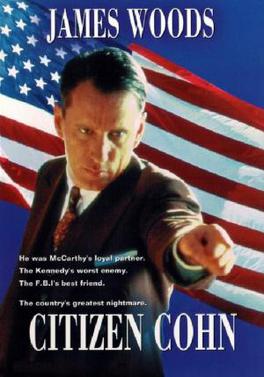 The year is 1986 and the powerful attorney Roy Cohn (James Woods) is dying. The official story is that Cohn has liver cancer but the truth is that he’s dying of AIDS. As he lies in his hospital bed, he thinks about his past and the events the led to him becoming one of the most feared and powerful men in America. He is haunted by the ghosts of his many enemies, people like communist spy Ethel Rosenberg (Karen Ludwig) and his former colleague, Bobby Kennedy (David Marshall Grant).
The year is 1986 and the powerful attorney Roy Cohn (James Woods) is dying. The official story is that Cohn has liver cancer but the truth is that he’s dying of AIDS. As he lies in his hospital bed, he thinks about his past and the events the led to him becoming one of the most feared and powerful men in America. He is haunted by the ghosts of his many enemies, people like communist spy Ethel Rosenberg (Karen Ludwig) and his former colleague, Bobby Kennedy (David Marshall Grant).
Not surprisingly, a good deal of Cohn’s memories center around his association with Sen. Joseph McCarthy (Joe Don Baker), a charismatic alcoholic who, in the 50s, charged that he had a list with the names of communist spies deep within the government. Cohn and Kennedy served as the counsels on McCarthy’s committees. Cohn is with McCarthy from the beginning and he’s with him until the end of the senator’s career. In fact, it’s Cohn’s own shadowy relationship with an army private that ultimately leads to McCarthy’s downfall.
Except for one aspect of the film, Citizen Cohn is one of the best films to ever be produced by HBO. The film covers a lot of history in a little less than 2 hours and it does so in a way that is always interesting and easy to follow. By including incidents from every phase of Cohn’s life, as opposed to just focusing on his time as McCarthy’, the film also shows how someone like Roy Cohn can become a behind-the-scenes power player despite the majority of the country having no idea who he is. James Woods gives one of his best performances as the hyperactive and unapologetically corrupt Cohn while Joe Don Baker is perfect as the self-pitying Joseph McCarthy.
The problem with the film, and your mileage may vary on how big an issue this is, is that it almost presents Cohn’s final days — dying of AIDS in a lonely New York hospital room — as being some sort of deserved fate for everything that he did wrong in life. For me, even in the case of someone like Roy Cohn, that’s a step too far and it comes very close to presenting AIDS as some sort of divine punishment (which, itself, comes dangerously close to mirroring the homophobic statements that were made — and still are being made — by anti-gay activists). That may not have been the film’s intention but, with the flashback structure and all of his dead enemies materializing to taunt Cohn as he lies dying, it’s still a very valid interpretation.
Some of that is perhaps unavoidable. Cohn, in both real life and the film, died largely unrepentant for anything he did during his life. As the central character of a biopic, Cohn never has the type of big moment that you would hope for, where he would realize that it was wrong for him to destroy so many lives and show at least a hint of contrition for his past behaviors. That Roy Cohn is even a compelling character is a testament to the talent of James Woods because it’s certainly not due to any sort of hidden goodness lurking underneath the surface of Cohn’s snarling personality. The lack of apologies and regrets that made Cohn a powerhouse in real life also makes him an ultimately unsatisfying subject for a movie.
 In rural Colorado, the three wives and all the children of Orville Beecham (Charlie Dierkop) have been murdered. Veteran journalist Garret Smith (Charles Bronson) discovers that Orville is the son of an excommunicated Mormon fundamentalist named Willis Beecham (Jeff Corey). Willis, who lives on a heavily armed compound, practices polygamy and wants nothing to do with the outside world. However, Willis’s brother, Zenas (John Ireland), long ago split with Willis and set up a compound of his own. At first, Garret suspects that Orville’s family was killed by Zenas. As Zenas and Willis go to war, Garret discovers that there’s actually a bigger conspiracy at work, one dealing with corporate greed and water rights. (Forget it, Bronson, it’s Chinatown.)
In rural Colorado, the three wives and all the children of Orville Beecham (Charlie Dierkop) have been murdered. Veteran journalist Garret Smith (Charles Bronson) discovers that Orville is the son of an excommunicated Mormon fundamentalist named Willis Beecham (Jeff Corey). Willis, who lives on a heavily armed compound, practices polygamy and wants nothing to do with the outside world. However, Willis’s brother, Zenas (John Ireland), long ago split with Willis and set up a compound of his own. At first, Garret suspects that Orville’s family was killed by Zenas. As Zenas and Willis go to war, Garret discovers that there’s actually a bigger conspiracy at work, one dealing with corporate greed and water rights. (Forget it, Bronson, it’s Chinatown.)